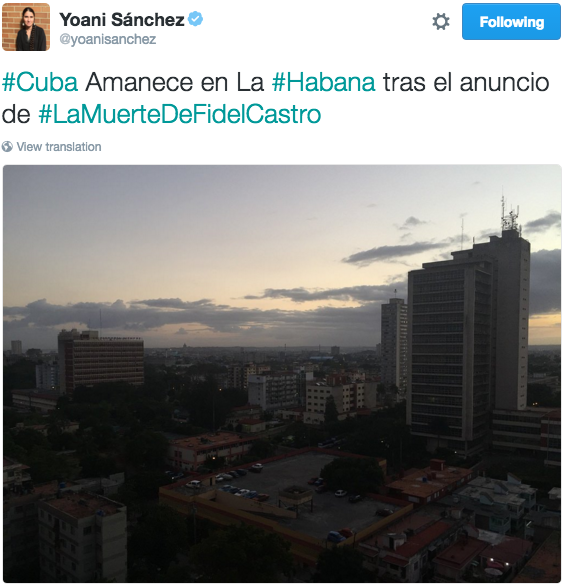![]() 14ymedio, Havana, 26 November 2016 – The Council of State has decreed nine days of national mourning, until 4 December. During this time, public activities and spectacles and the flag will fly at half mast on public buildings and military establishments.
14ymedio, Havana, 26 November 2016 – The Council of State has decreed nine days of national mourning, until 4 December. During this time, public activities and spectacles and the flag will fly at half mast on public buildings and military establishments.
The Organizing Committee of the Cuban Communist Party Central Committee, the State and the Government said that on the 28th and 29th November, between 9:00 AM and 10 PM, Fidel Castro’s funeral will be held. On 29 November, at 7:00 PM, there will be a ceremony at the Plaza of the Revolution.
The situation recalls the movie “De Eso No Se Habla” (I Don’t Want to Talk About It), one of the last films Marcello Mastrioianni starred in, about a woman dwarf from a wealthy family, and no one was allowed to say she was “small.” People cross the street and don’t say a single word about the “elephant” in the of the room.
Employees of several cafes and bars visited in Havana’s Plaza of the Revolution district fear that they will soon be informed to stop selling alcoholic beverages… and I still haven’t had my sip of rum…
Placido Domingo’s planned concert at the Alicia Alonso Theater, for which some 500 foreign guests with reserved seats have already arrived in Havana, has been cancelled, according to what his son and manager told CNN.
This is a strangely quiet Saturday morning. The non-tourist neighborhoods are oddly empty. There are no elderly people re-selling cigarettes, no one standing in line for a newspaper, no gossips talking on the corner, no kids scampering down the sidewalk. It is as if there was a tacit agreement to stay inside until we see what is happening.

The flow of traffic on Rancho Boyeros Avenue is greatly diminished for a weekend, not least because today they announced the run-through of the military parade and drivers had already taken other routes.
The situation is reminiscent of what happened the day after the announcement on 31 July 2006 of Fidel Castro’s illness. At that time there were fewer people on the street than normal, and it now appears that caution is being repeated.
Sun, heat, some clouds. Havana the day after looks like a city in mid-summer, if it weren’t for the calendars showing November.
A personal comment, the news has caught many opposition leaders traveling abroad. Among them Berta Soler, Antonio Rodiles, Manuel Cuesta, and even Pedro Campos who is living in Miami…
Several private businesses have not opened their doors. Perhaps out of fear.
Among the comments most often heard are those about a prolonged and bigger dose of ideology on official TV, which in recent weeks has already been increased several degrees.
TV is broadcasting some statements, previews, from Miguel Barnet who assures us that “Fidel is like poetry, ageless. Fidel is not a man, he is an idea.”
National television is beginning to broadcast interviews with young people, their voices breaking, on the verge of tears, when they speak of the death of Fidel Castro. There are students of international relations that right now are “supporting” a tribute to the fallen leader on social networks.
At the entrance to the President Hotel, a taxi driver showed his phone to an unbelieving colleague, “No, son, it’s a lie.” A man turns on state radio, where the news is being broadcast, to settle it.
Waiting for the decisions and report due in a few hours from the Commission in charge of the posthumous tribute, it is expected that the ashes of the commander in chief may be displayed at the base of the Monument to Jose Marti in the Plaza of the Revolution, as was done on the death of commander Juan Almeida. It raises the question of whether the 60th anniversary of the landing of the yacht Granma, with a military parade and a March Of The Combative People, will be held as planned on 2 December.

A driver on Bus Route 174 listens to several passengers commenting on the matter and says: “Gentlemen, don’t make me angry, but here on my bus we don’t play around with that.”
Friday at midnight, Havana seems oblivious to the news. Those leaving restaurants and nightclubs hear about it from their cell phones.
They are putting a documentary with less laudable moments … talks about people the regime calls “the worms” who “don’t get it on with señoritas, they play with other men.”
Documentaries broadcast on official television for the occasion repeat the starring role played by the United States: the obsession with Fidel Castro.
“Is it true this time?” The most repeated phrase on the phone along with the news of the death. “Nah, it must be a rumor,” the first response.
Raul Castro’s message is rebroadcast. On national television, the announcer is dressed in black and looks lost. Nervous and erratic, she starts to read the reactions of Latin American presidents on hearing the news.
Widespread commentary that “The Bastión (war games) was a dress rehearsal for the funeral.”

Many Cuban immigrants have advised their relatives in Cuba, because the news was broadcast at a time when few were watching television.
In the most populous neighborhoods of Havana, many people are glued to the screens of their TVs to watch the programming that comes by illegal satellite dishes.
The phones start ringing … an echo of “ring ring” is heard everywhere.

The only thing Heard in central Havana is the sound of the truck that just went by to pick up the trash.
